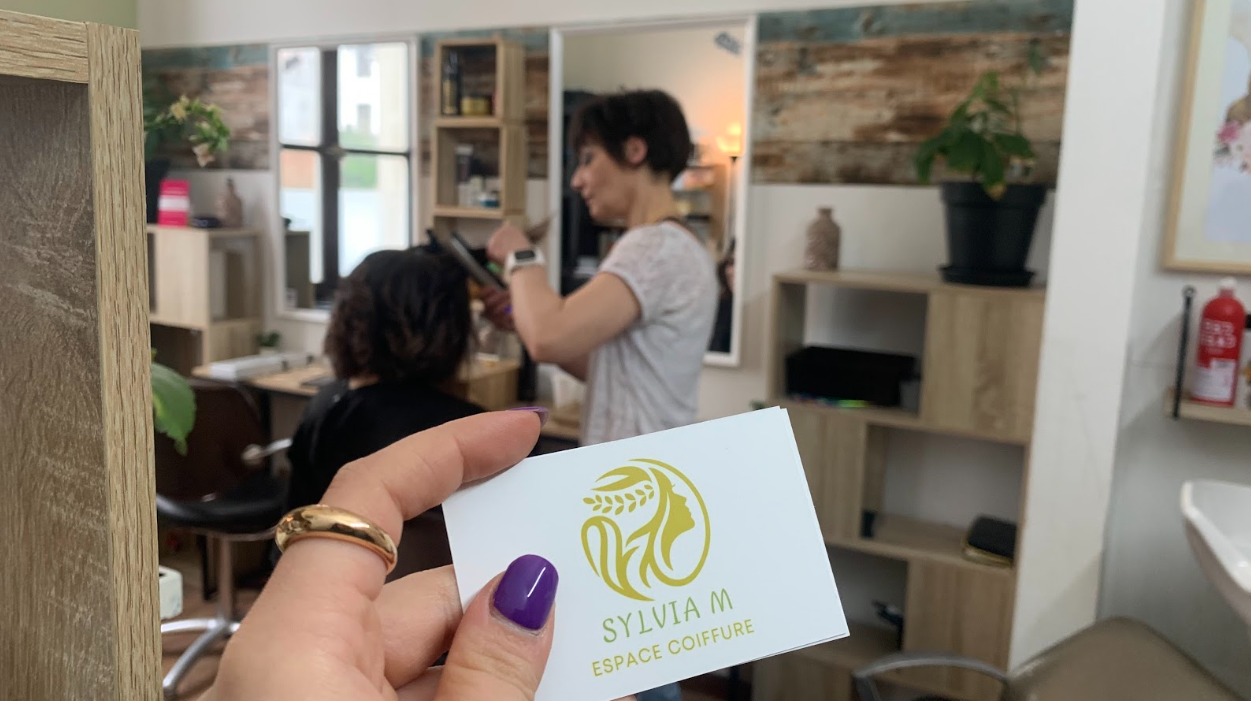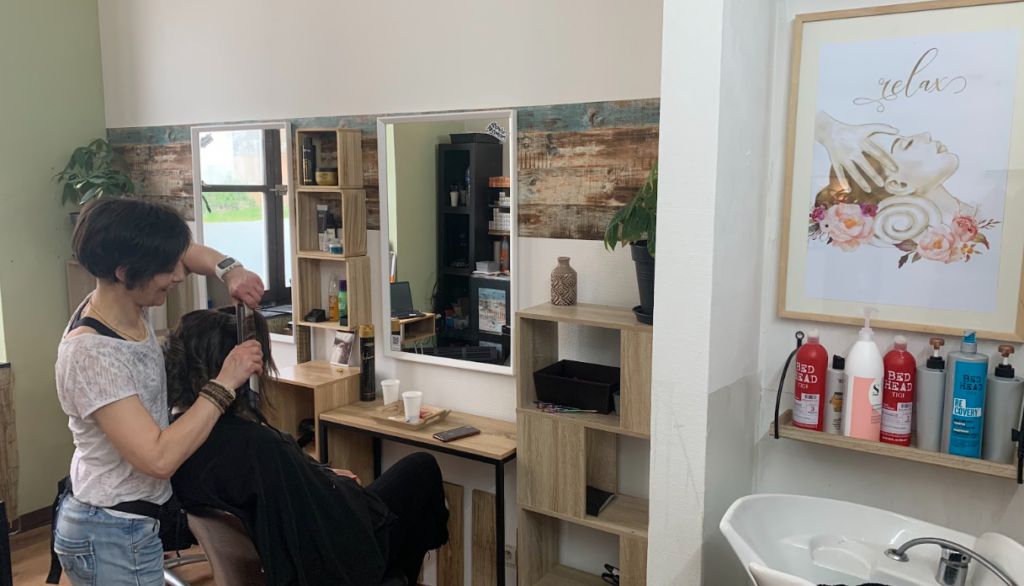
Meet Our Residents : Sylvia Slow Hair
“Meet our Residents” est une série d’articles destinés à mettre en valeur les supers projets des supers résidents de l’occupation temporaire du Grand Hospice. L’ensemble des projets y est réparti selon quatre thématiques : Développement durable, Communauté, Art & Culture, et Éducation & Santé.
Sylvia, auto-entrepreneuse, a ouvert son salon de coiffure au sein du Grand Hospice il y a quelques mois. Elle prône des valeurs fortement axées sur le développement durable et l’accessibilité financière. En plus de prôner des valeurs importantes, elle est partie prenante de l’économie circulaire, notamment via la Zinne, la monnaie locale bruxelloise.
Elle souhaite également conscientiser aux réalités socio-économiques et à la dévalorisation des métiers liés à la mise en beauté. On voit bien qu’il y a tout un tas d’événements autour de ce métier, des salons, des récompenses, mais on ne parle jamais des problèmes professionnels que rencontrent les salariés au quotidien. Et pourtant, tous ces petits salons font l’économie d’une ville !
Il y a énormément de salons de coiffure en métropole bruxelloise. Sylvia se différencie de par sa personnalité et le concept actuel “slow” qu’elle souhaite développer dans son salon. On vous en dit plus à travers cet article !
Décris-moi ton activité et ta reconversion professionnelle.
Coiffeuse expérimentée depuis plus de 25 ans, je me suis investie dans ce projet car je suis arrivée à l’âge fatidique de la remise en question. Après avoir travaillé dans tous les salons de Bruxelles, je tournais en rond. Je n’étais qu’un numéro à faire des chiffres, on était jamais reconnaissant de mon travail même si je me donnais corps et âme, ça ne me correspondait pas du tout.
Suite à 20 ans de patronat qui ne s’est jamais bien passé, c’était LA belle opportunité pour une reconversion professionnelle ! J’ai choisi de créer un concept qui tourne autour du terme slow, un terme qui revient fréquemment actuellement. Le slow hair, c’est un principe qui met l’accent sur des pratiques durables et respectueuses de l’environnement. C’est une chose non aisée en coiffure puisqu’on utilise beaucoup d’eau, beaucoup de produits ainsi que du papier aluminium, par exemple.
Pour répondre à cette tendance, on va utiliser des produits à 98% d’origine végétale, uniquement extraits de plantes et de fleurs. On va utiliser des papiers réutilisables qu’on rince et non pas des Climazon (thermo activateur avec ventilation) qui prennent un tas d’électricité : c’est une façon d’économiser l’énergie. On travaille également avec des techniques de colorations qui sont douces et on va privilégier des éclaircissement naturels plutôt que d’arriver à des blonds très blanc.
En pratique, le principe du slow c’est quoi ?
Pour moi, le slow se retrouve à partir du moment où le client entre et jusqu’à ce qu’elle parte. Mes clients sont pris en charge dès l’entrée. De fait, tous les coiffeurs font un diagnostic, mais la différence et mon point fort c’est mon engagement. Je veux comprendre les besoins du client pour restituer au mieux ces envies.
Exemple, tu vas rentrer chez le coiffeur et demander qu’on te coupe les pointes. Finalement, c’est 10 centimètres qui sont coupés parfois ! Je ne suis pas la coiffeuse qui va obliger la clientèle à une transformation, je souhaite simplement répondre aux besoins qu’elles ont. Chaque cliente est respectée, c’est le point d’honneur de la maison. Ça rejoint le principe du slow puisqu’on décortique les besoins, on fait connaissance, on prend le temps pour le diagnostic et de connaître le passé du cheveux. Ce concept s’adapte bien à la nouvelle économie aussi, on sort du confinement du covid et beaucoup de choses ont changé. Ici, on ne prend pas le client en otage en forçant des ventes, on conseille à la demande.
L’idée du projet c’est aussi de conscientiser, ce métier est trop dévalorisé. Pour faire une belle coupe en peu de temps, il nous faut des années d’expériences. De plus, il faut conscientiser sur l’argent car dans notre société actuelle, on veut tout pour peu cher et cela n’est pas possible quand on utilise de bons produits et qu’on travaille sur une coupe et une coloration pendant 2 à 3 heures.
Le concept slow c’est aussi synonyme de durabilité. Il est primordial de conscientiser sur les enjeux sociaux-économiques. C’est ce que j’essaye de faire en utilisant des produits végétaux, en recyclant les cheveux coupés également. On rejoint aussi l’économie circulaire via la Zinne, monnaie locale bruxelloise, qui est acceptée au salon. Toutes ses valeurs sont importantes et c’est ce qui porte le projet et pas seulement le projet, c’est ce que j’essaie de faire au quotidien en achetant en deuxième main, en faisant de la récupération, en éduquant mes enfants de cette manière.
Aujourd’hui j’ai créé quelque chose qui me ressemble, de la décoration de mon espace, aux produits utilisés et à ma philosophie, j’espère que ça plaira !
Quels sont vos moyens financiers ?
C’est clairement de l’autofinancement. J’ai mis toutes mes économies dedans pour ne pas avoir de mensualité. Quand j’ai vu l’appel à projet, je suis venue visiter l’endroit et c’était le coup de cœur ! De plus, en mettant mon projet en œuvre dans une occupation temporaire, c’était le meilleur moyen de se lancer sans trop de risques.
Je suis accompagnée par JobYourself, accompagnateurs de jeunes entrepreneurs. Ils m’ont donné toutes les clés à avoir et donc un grand merci à eux ! Il m’a fallu 3 ans pour construire, développer et mettre ce projet sur les rails. Maintenant je peux gérer mon temps comme je le souhaite entre ma vie de famille, ma profession et mes loisirs. Je suis vraiment heureuse de faire partie des acteurs de la nouvelle économie.
Qu’est ce qui te plaît le plus en tant que résidente au Grand Hospice ?
Alors, disons d’entrée de jeu que l’entrepreneuriat n’est vraiment pas facile. C’est énormément de bas et de remise en question. Après, on y met vraiment du nôtre donc ça rend les choses belles. Les plus beaux moments que j’ai vécu ici, c’est surtout ceux passés avec les clients qui soutiennent réellement mon projet et ma personne. Celles qui comprennent où je veux aller, qui m’apportent un réel soutien alors que ce sont des personnes inconnues. Ça me donne la chair de poule rien qu’à y penser !
Sinon, un moment qui m’a marqué c’est lorsque j’ai découvert le lieu et surtout quand j’ai vu le jardin ! Je suis très nature, je trouve qu’il n’y a rien de plus agréable entre deux clients que d’aller prendre un café à l’extérieur et en plus, il n’y a pas de collègue qui va me balancer au patron (rires) ! Ce sont des conditions de travail exceptionnelles, ça n’a pas de prix. On est dans un cadre exceptionnel, on a de la chance. Il faut en profiter et surtout, en faire profiter les autres !

Passionnés par la coiffure ou simplement friands de nouvelles expériences ? Venez participer aux workshops chez Sylvia, vous retrouverez les dates dans son agenda sur son site officiel.
Vous pouvez également retrouver l’activité hebdomadaire “Les Jeudis Sympas” qui se veulent être inclusifs, à un prix conscient !
Envie de suivre le projet ? C’est par ici !
Et pour découvrir tous les projets résidents du Grand Hospice, c’est par là !

